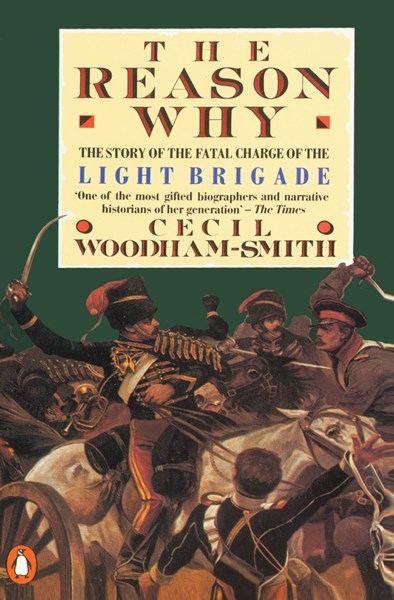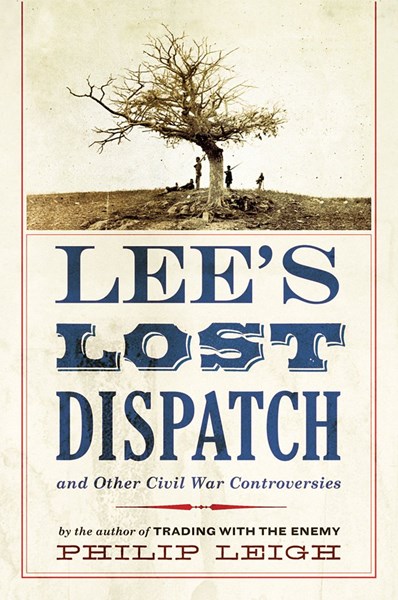
As a means to a brief escape from the (so far) miserable 21st century I picked up and began reading The Reason Why, an excellent work of nonacademic history published in 1953 by Cecil Woodham-Smith (in England, the sexes share the name “Cecil,” as they do “Evelyn”) that tells the background story of the famous charge of the Light Brigade against a Russian gun emplacement near Balaclava in the Crimea on October 25, 1854. The charge was ordered by Lord Lucan and led by Lord Cardigan, brothers-in-law who detested each other equally. Owing to a miscommunication in the chain of command, the British cavalry was sent against the wrong artillery; and though it managed to overrun the guns and kill some Russian soldiers, it was forced to retreat at once. Of the more than 700 horsemen who rode down the narrow valley under withering crossfire from the high ground left and right, 195 returned. Lucan and Cardigan, both arrogant and unpleasant men—the first entirely careless of human life and the second an infamous martinet—were as brave as they were insufferable, as even their detractors admitted. Following the battle, Cardigan returned to his yacht, where he had a bath, drank a bottle of champagne, and went to bed. The book’s penultimate chapter (I skipped ahead to read it) gives a superb account of the charge itself, one of the best I’ve read in military history, and in fiction. Tolstoy himself never wrote a better battle scene.
In 13 previous chapters, Mrs. Woodham-Smith relates the historical, political, and personal background to the disaster. During Cromwell’s Commonwealth, the English lived under a military dictatorship and were ruled by professional army officers, many of whom were military adventurers. After the Restoration, Parliament, determined that the experience should never be repeated, passed an act to create a standing army under commissioned officers who paid large sums for their commissions. This was meant to assure that the army should henceforth be under the control of men with a substantial stake in the country. Every human arrangement is subject to exploitation and corruption; and, in time, the system of bought commissions came to be abused by men of wealth (landed aristocrats chiefly) who bought regiments and then very often left them, only to repurchase and renew their commissions at a later date. The arrangement ensured that the army at its highest levels was controlled by military amateurs, many of whom had no experience in the field and were innocent of military strategy. Such were Lucan and Cardigan. The former, by far the better soldier, considered his brother-in-law unfit to command a regiment; and indeed the latter became for a period before Crimea the most hated man in England for his infamous maltreatment of his men. Upon these two men, the author shows, and the system in which they achieved military power, responsibility for the ill-fated charge, memorialized by Tennyson only six weeks after the disaster, rests.
—Chilton Williamson, Jr.

Good history is a delight to read; it consists of stories well told. To tell a good story, you have to possess some insight into human nature—passions, vices, virtues. You have to know how people of various stations in life speak and act. (No one talks as John Galt does.) You also need to know how to build dramatic tension. To accomplish that, you must be observant of human events large and small. You also need to evoke at least some sympathy for your characters; otherwise, who cares whether anyone lives or dies?
Independent historian Philip Leigh tells a good story and backs it with excellent scholarship. I am thoroughly enjoying his collection of short historical episodes published under the title Lee’s Lost Dispatch and Other Civil War Controversies (2015). “Ghosts of the Lost Dispatch” is a balanced look at the mystery pertaining to Robert E. Lee’s Special Order No. 191, which conveyed Lee’s dangerous strategy for the Army of Northern Virginia—key movements designed to draw Federal troops north and away from Washington, D.C., in the fall of 1862. Demoralized by heavy losses during the Peninsula Campaign and at Second Manassas, the Army of the Potomac would be cut off and crushed. But Lee’s strategy required his smaller army to be separated briefly into five components, leaving them temporarily vulnerable. One of three copies of Lee’s dispatch was lost in transit, and the order (wrapped around three cigars and jammed into an open envelope) wound up in the hands of General McClellan. “Thereafter he wired Lincoln, ‘I have all the Rebel plans and will catch them in their own trap.’” A Confederate sympathizer in Washington saw to it that Lee was duly warned, and Lee made the necessary adjustments. But thus was lost arguably the best chance the Confederacy had at winning the war. By using the question of just how the envelope was lost and found to begin with as a framing device, Leigh masterly weaves together an informative narrative of the War in 1862.
With all the talk of the Deep State these days, it’s particularly insightful, even delightful, to read of the lies, the Machiavellian manipulations, and the press leaks of the Lincoln administration. Leigh’s chapters “Lincoln and McClellan” and “Treasury Innovations and Mischiefs” are verisimilar and repeat (only between the lines) the Solomonic wisdom that there is nothing new under the sun. And “The Camelot Couple,” a fascinating chapter about the political romance of young Rhode Island Gov. William Sprague and the cloyingly fetching Kate Chase, daughter of Salmon P., should be adapted as a script for a Netflix Original Series. Even the father-daughter relationship (Salmon had three wives; Kate imagined her father as President and herself as his First Lady) of shared ambition, tarred by rivals with wicked rumor, feels familiar.
—Aaron D. Wolf
Leave a Reply